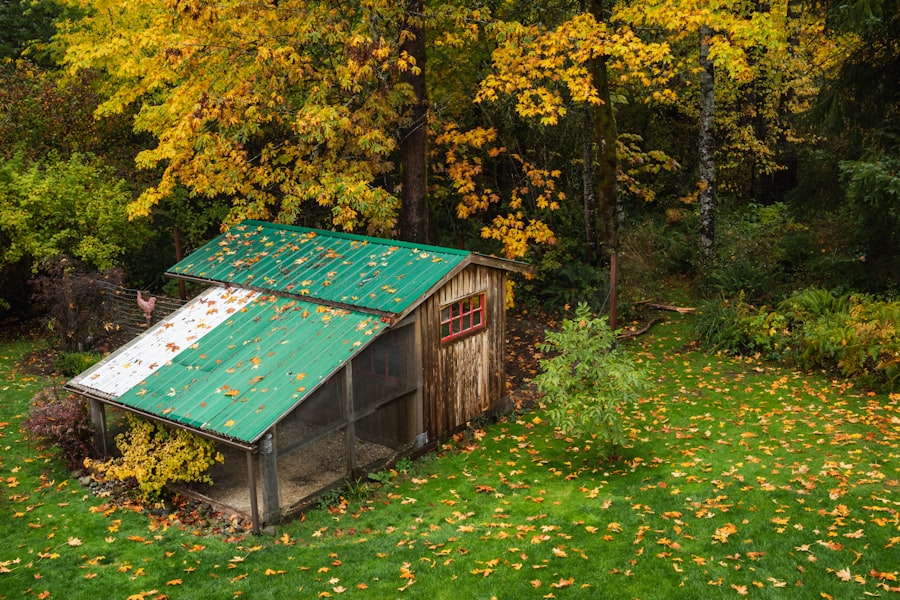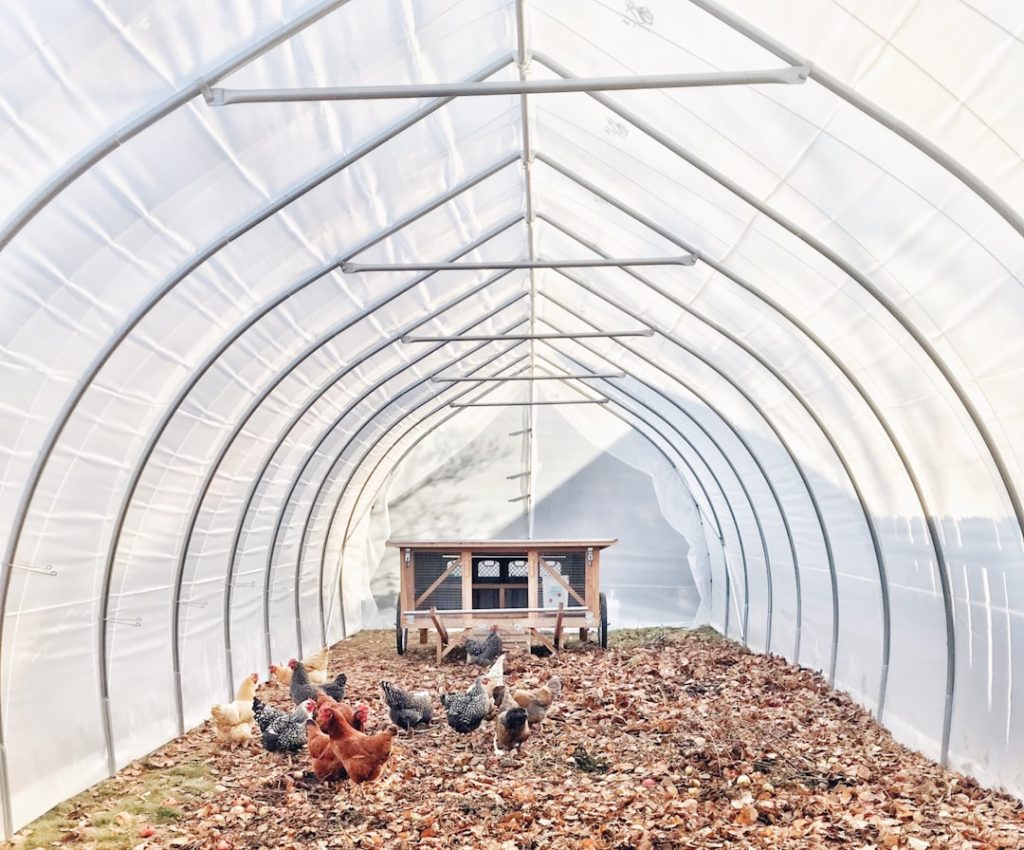When establishing a backyard chicken flock, the initial step involves creating an appropriate coop for the birds. The coop must offer protection from weather conditions and predators while providing sufficient space for the chickens to move freely. Selecting a well-drained location with proper ventilation is crucial.
The coop should be positioned in an area that receives ample sunlight throughout the day. Coop construction options include purchasing pre-fabricated structures or building from scratch. Those opting to construct their own coop should utilize high-quality materials to ensure adequate insulation and protection.
Essential components of a coop include nesting boxes for egg-laying and roosting bars for nighttime perching. In addition to the coop, a secure outdoor run is necessary for daytime access. The run should be enclosed with wire mesh to prevent predator intrusion and include shelter to protect chickens from sun and rain.
Proper initial setup and coop construction are fundamental in creating a safe and comfortable environment for a backyard chicken flock.
Table of Contents
- 1 Daily Care and Maintenance
- 2 Health and Veterinary Concerns
- 3 Predators and Security Measures
- 4 Egg Production and Collection
- 5 Behavioral Management and Social Dynamics
- 6 Legal and Zoning Considerations
- 7 FAQs
- 7.1 What are the basic requirements for keeping chickens?
- 7.2 How much time and effort is required to care for chickens?
- 7.3 What are the common challenges in keeping chickens?
- 7.4 Are there any legal restrictions or regulations for keeping chickens?
- 7.5 What are the potential health risks associated with keeping chickens?
- 7.6 What are the costs associated with keeping chickens?
Key Takeaways
- Proper coop construction is essential for the safety and comfort of your chickens.
- Daily care and maintenance include providing fresh water, food, and cleaning the coop regularly.
- Regular health check-ups and vaccinations are important to prevent diseases in chickens.
- Predators like foxes and raccoons can be a threat, so secure the coop with strong fencing and locks.
- Collect eggs daily and provide a clean and comfortable nesting area for your chickens.
Daily Care and Maintenance
Providing Essential Necessities
Once the coop is set up, it’s crucial to establish a daily care routine for your backyard chickens. This routine should include tasks such as feeding and watering the birds, collecting eggs, and cleaning the coop and run. Chickens should have access to fresh water at all times, and their feed should be a balanced diet that includes grains, protein, and calcium.
Maintenance and Hygiene
In addition to feeding and watering, it’s essential to regularly clean the coop and run to prevent the buildup of waste and bacteria. This can be done by removing soiled bedding from the coop and replacing it with fresh material, as well as regularly raking and cleaning the run. Regular maintenance of the coop and run will help to keep your chickens healthy and prevent the spread of disease.
Monitoring Health and Well-being
Another important aspect of daily care is monitoring the health of your chickens. This includes checking for signs of illness or injury, as well as keeping an eye out for any behavioral changes in the birds. By establishing a consistent daily care routine, you can ensure that your backyard chickens stay healthy and happy.
Health and Veterinary Concerns

Keeping your backyard chickens healthy is a top priority for any chicken keeper. There are several common health concerns that can affect chickens, including respiratory infections, parasites, and injuries. It’s important to monitor your chickens regularly for signs of illness or injury, and to seek veterinary care if necessary.
In addition to regular monitoring, there are several preventative measures that can be taken to keep your chickens healthy. This includes providing a clean and dry living environment, as well as a balanced diet that meets their nutritional needs. It’s also important to practice good biosecurity measures, such as limiting exposure to wild birds and other potential sources of disease.
In the event that one of your chickens does become ill or injured, it’s important to seek veterinary care from a professional who is experienced in treating poultry. A veterinarian can provide a proper diagnosis and treatment plan for your chicken, which may include medications or other forms of care. By staying proactive about the health of your backyard chickens, you can help to prevent illness and ensure a long and happy life for your flock.
Predators and Security Measures
One of the biggest challenges of keeping backyard chickens is protecting them from predators. Common predators of chickens include raccoons, foxes, hawks, and even domestic dogs. To keep your flock safe, it’s important to implement effective security measures around the coop and run.
One of the most important security measures is to ensure that the coop and run are securely enclosed with wire mesh that is buried at least a foot into the ground to prevent digging predators from gaining access. Additionally, it’s important to secure all openings with locks or latches that are predator-proof. Regularly inspecting the coop and run for any signs of damage or weakness in the security measures is also crucial.
In addition to securing the physical structure of the coop and run, it’s important to be mindful of potential threats from above. Installing netting or other forms of overhead protection can help to deter aerial predators such as hawks. By implementing these security measures, you can help to protect your backyard chickens from potential threats and ensure their safety.
Egg Production and Collection
One of the many benefits of keeping backyard chickens is the opportunity to collect fresh eggs on a regular basis. In order to maximize egg production, it’s important to provide your chickens with a balanced diet that meets their nutritional needs. This includes a feed that is high in protein and calcium, as well as access to fresh water at all times.
In addition to diet, providing a comfortable and stress-free environment for your chickens can also help to encourage egg production. This includes ensuring that the coop is clean and well-ventilated, as well as providing enough space for the birds to move around comfortably. Regularly collecting eggs from the nesting boxes can also help to encourage continued egg laying.
When it comes to collecting eggs, it’s important to handle them with care in order to prevent breakage or contamination. Eggs should be collected daily and stored in a cool place until they are ready to be used. By providing a suitable environment and proper care for your chickens, you can enjoy a steady supply of fresh eggs from your backyard flock.

Establishing a Pecking Order
One common behavior among chickens is establishing a pecking order, a social hierarchy within the flock. This can sometimes lead to aggression between birds, so it’s crucial to provide enough space and resources for all chickens to minimize conflict.
Providing Enrichment Activities
In addition to managing social dynamics, it’s vital to provide enrichment activities for your chickens to prevent boredom and reduce stress. This can include providing objects for pecking and scratching, as well as access to outdoor areas where they can engage in natural behaviors such as dust bathing. By providing enrichment activities, you can help to promote positive behaviors within the flock.
Introducing New Birds
When introducing new birds into an existing flock, it’s essential to do so gradually and under supervision to minimize stress and potential conflict within the flock. This can help to prevent disruptions to the established social dynamics and promote a harmonious environment.
By understanding and managing the behavioral dynamics of your backyard flock, you can help to create a peaceful and thriving environment for your chickens.
Legal and Zoning Considerations
Before starting a backyard chicken flock, it’s important to be aware of any legal or zoning considerations in your area that may affect your ability to keep chickens. Some municipalities have specific regulations regarding the number of chickens allowed per property, as well as restrictions on coop size and placement. It’s important to familiarize yourself with these regulations in order to ensure compliance.
In addition to local regulations, it’s also important to consider any potential restrictions imposed by homeowners’ associations or rental agreements. Some neighborhoods may have specific rules regarding keeping chickens on residential properties, so it’s important to review any relevant documents before starting a flock. By being aware of legal and zoning considerations, you can ensure that you are in compliance with any regulations that may affect your ability to keep backyard chickens.
This can help to prevent potential conflicts with neighbors or local authorities, and allow you to enjoy keeping a backyard flock within the parameters of the law.
If you’re interested in learning more about the challenges of keeping chickens, you should check out the article on what kind of coop is best for chickens on PoultryWizard.com. This article provides valuable information on the importance of choosing the right coop for your chickens and the factors to consider when making this decision. It’s a great resource for anyone looking to start or improve their chicken-keeping experience.
FAQs
What are the basic requirements for keeping chickens?
Chickens require a secure coop or housing, access to fresh water, proper nutrition, and protection from predators.
How much time and effort is required to care for chickens?
Caring for chickens requires daily feeding, watering, and egg collection, as well as regular coop cleaning and maintenance. It can be time-consuming, especially during extreme weather conditions.
What are the common challenges in keeping chickens?
Common challenges in keeping chickens include predator attacks, disease prevention, and maintaining a clean and odor-free coop. Additionally, providing proper nutrition and managing the pecking order within the flock can be challenging.
Are there any legal restrictions or regulations for keeping chickens?
Many urban and suburban areas have zoning laws and regulations that dictate the number of chickens allowed, coop placement, and noise restrictions. It is important to check local ordinances before keeping chickens.
What are the potential health risks associated with keeping chickens?
Chickens can carry diseases such as salmonella, avian influenza, and parasites that can be transmitted to humans. Proper hygiene and biosecurity measures are essential to minimize health risks.
What are the costs associated with keeping chickens?
The initial costs of setting up a coop and purchasing chickens, as well as ongoing expenses for feed, bedding, and veterinary care, can add up. It’s important to consider these costs before deciding to keep chickens.
Meet Walter, the feathered-friend fanatic of Florida! Nestled in the sunshine state, Walter struts through life with his feathered companions, clucking his way to happiness. With a coop that’s fancier than a five-star hotel, he’s the Don Juan of the chicken world. When he’s not teaching his hens to do the cha-cha, you’ll find him in a heated debate with his prized rooster, Sir Clucks-a-Lot. Walter’s poultry passion is no yolk; he’s the sunny-side-up guy you never knew you needed in your flock of friends!







